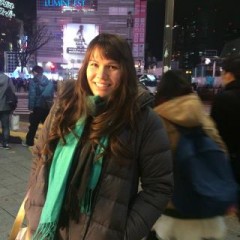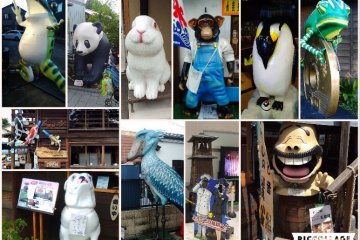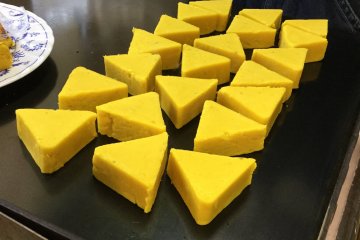Suzuki Tozaemon, born and raised in Tokyo, started making simple sweets at the start of the Meiji Period. This sweets shop, which still stands today, can be find in Penny Candy Alley (Kashiya Yokocho) in Kawagoe City.
Unfortunately, Penny Candy Alley burned down during the Great Earthquake of the Taisho Era in 1923. The area was rebuilt and by the beginning of the Showa Era, there were over 70 shops.
Today there remains about 20 confectionery shops, still making those simple, homemade sweets from long ago. The whole area brings back feelings of childhood nostalgia for many of its visitors. The streets are lively with local staff, and the smell of sweets and soy sauce entice visitors.
Most of the shops also double as housing for the staff, so the entire community is like a family. Even visitors can feel the warmth and strong ties between the shop owners along this street.
"We are merely humble shopkeepers working out of the kindness of our hearts" is the motto for Penny Candy Alley. Shop owners gather every once in a while to have a meeting, something that is unique among what is generally considered competing shops.
The golfing portion of the Tokyo 2020 Olympics are set to be held in Kawagoe City. In preparation for this, the area is already working hard to add foreign languages to their menus and shops.
Each shop has its own selling point, rather than selling the same product. Raku Raku (楽楽) is a bakery boasting handmade yeast made with local flour. Tamariki Confectionery Shop (玉力製菓)uses a family recipe handed down through the generations to make their products.
Matsuriku Confectionery Shop has been around since the 8th year of the Kansei period (1796), making it the oldest shop making candy from brown sugar in Japan.
Inabaya's main shop specializes in using potatoes to make donuts and sweets that are famous in Kawagoe City. Rather than a street filled with shops selling similar confections, Penny Candy Alley offers a variety of products for their customers' enjoyment.
In Japan, it is generally considered bad manners to eat while walking. Penny Candy Alley, however, is somewhere where you can nibble on treats as you walk without worrying about being rude.
You have a lot of snack options to choose from on this one street, from rice balls (dango) to octopus on sticks. Hama-chan sells boiled Japanese food such as egg, radish and fish cakes (oden), sweet potato fries, and other items at a reasonable price. The shop is run by a kind man who is also a chairman of the shops in the Penny Candy Alley area. It is a nice place to stop by for a chat if you find yourself nearby.
Every year on the second Saturday of April, there is a festival in Penny Candy Alley. The points of interest at this festival change every year, but you can always try traditional activities such as a traditional Japanese spinning top known as Beigoma, or ventriloquist shows.















